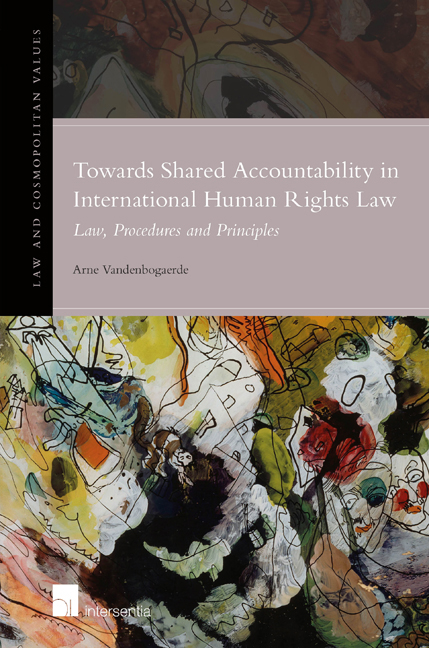Book contents
- Frontmatter
- Preface
- Acknowledgment
- Contents
- List of Abbreviations
- Chapter 1 Introduction
- PART I UNDERSTANDING ACCOUNTABILITY
- PART II ACCOUNTABILITY IN INTERNATIONAL AND REGIONAL HUMAN RIGHTS LAW: PROCESSES, PRACTICE AND LIMITS
- Chapter 3 State Reporting Procedures at the International and Regional Level
- Chapter 4 Individual, Collective and Inter-State Complaint Procedures in the International and Regional Accountability Framework
- Chapter 5 Inquiry Procedures in the International and Regional Accountability Framework
- Chapter 6 International Peer-Review Accountability Mechanisms
- Chapter 7 Special Procedures in the International and Regional Systems
- Conclusions Part II
- PART III CONTOURS OF A MULTI-DUTY BEARER FRAMEWORK
- Conclusion: Contours and Viability of A Multi-Duty-Bearer Framework
- Bibliography
- Law and Cosmopolitan Values
- Instructions to authors
Chapter 7 - Special Procedures in the International and Regional Systems
from PART II - ACCOUNTABILITY IN INTERNATIONAL AND REGIONAL HUMAN RIGHTS LAW: PROCESSES, PRACTICE AND LIMITS
Published online by Cambridge University Press: 13 December 2017
- Frontmatter
- Preface
- Acknowledgment
- Contents
- List of Abbreviations
- Chapter 1 Introduction
- PART I UNDERSTANDING ACCOUNTABILITY
- PART II ACCOUNTABILITY IN INTERNATIONAL AND REGIONAL HUMAN RIGHTS LAW: PROCESSES, PRACTICE AND LIMITS
- Chapter 3 State Reporting Procedures at the International and Regional Level
- Chapter 4 Individual, Collective and Inter-State Complaint Procedures in the International and Regional Accountability Framework
- Chapter 5 Inquiry Procedures in the International and Regional Accountability Framework
- Chapter 6 International Peer-Review Accountability Mechanisms
- Chapter 7 Special Procedures in the International and Regional Systems
- Conclusions Part II
- PART III CONTOURS OF A MULTI-DUTY BEARER FRAMEWORK
- Conclusion: Contours and Viability of A Multi-Duty-Bearer Framework
- Bibliography
- Law and Cosmopolitan Values
- Instructions to authors
Summary
PROCEDURES
In the following sections we will discuss the system of special procedures in the international and regional human rights systems. There are currently no special procedures under the European Social Committee and therefore this regional system is not included in our analysis.
SPECIAL PROCEDURES OF THE HUMAN RIGHTS COUNCIL
The system of Special Procedures of the Human Rights Council has been inherited from the Commission on Human Rights. In what was probably one of its greatest achievements, the Commission on Human Rights developed an extensive web of Special Procedures in the form of thematic and country-specific rapporteurs/independent experts and Working Groups.
While the thematic procedures focus on one specific issue across all countries, the country-specific procedures focus on all relevant issues in one specific country. The thematic procedures can thus investigate the human rights situation in any given country, irrespective of the ratification of a human rights treaty. The special procedures can thus address human rights situations at the global, country and local level. The special procedures can also cover all the substantive rights, civil and political as well as ESC rights.
The mandates generally relevant to dealing with ESC rights are the Special Rapporteur (SR) on the right to food (SR food), the SR on extreme poverty and human rights (SR on extreme poverty), the SR on the right of everyone to the enjoyment of the highest attainable standard of physical and mental health (SR health), the SR on the rights of indigenous peoples (SR indigenous), the SR on the human rights of migrants (SR Migrants), the SR on the right to education, the SR on the human right to safe drinking water and sanitation (SR water), and the Independent Expert (IE) on the issue of human rights obligations relating to the enjoyment of a safe, clean, healthy and sustainable environment (IE Environment).
In addition, some mandates are particularly relevant as they were in essence created to address extraterritorial or transnational issues.
- Type
- Chapter
- Information
- Towards Shared Accountability in International Human Rights LawLaw, Procedures and Principles, pp. 155 - 170Publisher: IntersentiaPrint publication year: 2016



